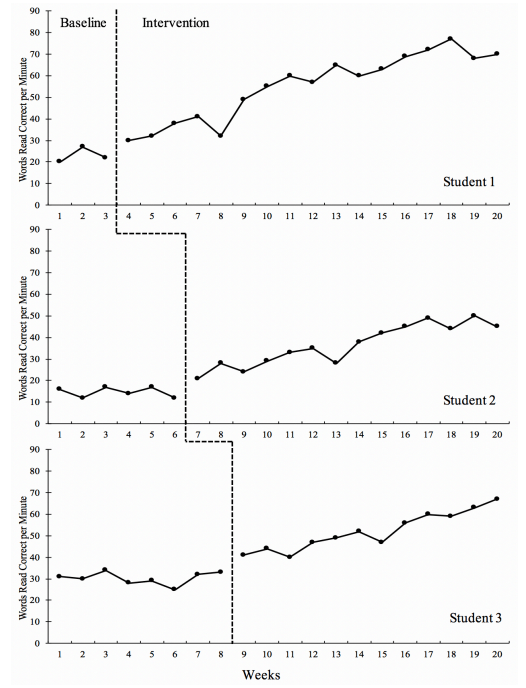Single-case experimental designs (SCEDs) are a flexible method educators and applied researchers use to evaluate the effects of behavioral and academic interventions in school-based settings. To use a SCED, an educator collects outcome data in the absence and the presence of an intervention. Changes in the level, trend, and variability of outcomes between phases and/or participants may be indicative of a functional relationship between the intervention and outcome of interest (e.g., word reading fluency). An example multiple-baseline design across participants SCED is presented below.
A key point of contention in the research community is the optimal method to identify the presence and magnitude of treatment effects. Historically, researchers and practitioners used visual analysis to identify treatment effects. Statistical methods to quantify treatment outcomes have also been explored. With the advent of the evidence-based intervention movement an increased emphasis has been placed on identifying viable strategies to aggregate outcomes from multiple SCED studies to better understand what interventions work best for whom.
The purpose of this project is to develop a free-to-use Bayesian-based effect size calculator for academic SCEDs. This project is funded through 2022 by the Institute of Education Sciences (#R305D190023-20). Graduate students in the lab have helped with identifying previously published SCED studies, extracting relevant descriptive information and raw data from those studies, conducting descriptive analyses of outcomes, and preparing conference presentations and manuscripts that result from the project.
Dr. Van Norman serves as the Project PI, Dr. David Klingbeil and Dr. James Pustejovsky from the University of Wisconsin-Madison, are Co-Principal Investigators.
More information about the project can be found here. Technical reports, datasets, and working manuscripts can be found here.


